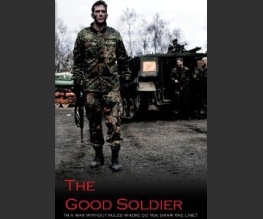The Good Soldier

The Good Soldier is a very small-scale indie war movie; a timely fable echoing the real-life horrors of Guantanamo Bay.
Sean Roberts takes up arms as a British soldier in order to fight the injustice he sees in his own country. When Britain is engulfed by an outbreak of civil war, Sean has proved himself as a soldier to such an extent that he is entrusted with work at an intelligence unit where prisoners of (civil) war are questioned by the military in secret. Half the cast in this war movie are credited as ‘torture victim’ – that gives you an idea of what kind of questioning goes on behind the veil of military secrecy.
The hooded British prisoners of war are dehumanised and stripped of their dignity and basic human comforts – it’s an ugly process designed to ensure interrogators are desensitised to the process. A good soldier, from the perspective of the military infrastructure, is an idealistic young man who takes professional pride in his ability to carry out any order. At the other end of the scale, the military seeks to promote soldiers who may be jaded with the realities of war but have tempered that with a pragmatism that enables them to carry out orders armed not with youthful idealism but “I don’t care”.
As the civil war draws out there is increasing pressure to break suspects via interrogation. Professionally, Sean is more than capable as both a soldier and an interrogator. Faced with hooded prisoners, the hoods lifted to reveal people just like him, can Sean keep saying ‘yes’ to promotions and assignments that are morally dubious? Will Sean be able to make the personal sacrifices necessary to become the military’s perfect version of the good soldier?
Writer/director Mike Maroney’s cinematography in the battle scenes aims for a high degree of realism, but the film is more of a cautionary tale – we would normally give this a star rating of 2.5, but raise that to 3 if you have an interest not only in war movies but in the dirty machinations of war itself. Interesting and provocative.



Recent Comments